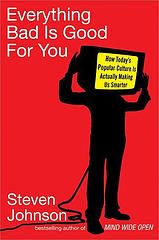Sony Europe is promoting a new screen technology with a TV commercial featuring 250,000 brightly colored balls rolling down a San Francisco street. despite the maudlin soundtrack the sight of a quarter of a million balls floating chaotically down the hill is spectacular. this is partially because the piece is silly, fantastical, and brilliantly executed. i wonder though, if part of the reason people like the ad so much is because real balls are rolling on a real street — because the absence of any computer graphics is so unusual in our increasingly everything-so-neat-and-clean digital mediascape? this is not meant to be a rhetorical question. what do you think?

Author Archives: bob stein
writing in the open
Mitch Stephens, NYU professor, was here for lunch today. when Ben and I met with him about a month ago about the academic bloggers/public intellectuals project, Mitch mentioned he had just signed a contract with Carroll & Graf to write a book on the history of atheism. today’s lunch was to follow up a suggestion we made that he might consider starting a blog to parallel the research and writing of the book. i’m delighted to report that Mitch has enthusiastically taken up the idea. sometime in the next few weeks we’ll launch a new blog, tentatively called Only Sky (shortened from the lyric of john lennon’s Imagine “. . . Above us only sky”). it will be an experiment to see whether blogging can be useful to the process of writing a book. i expect Mitch will be thinking out loud and asking all sorts of interesting questions. i also think that readers will likely provide important insight as well as ask their own fascinating questions which will in turn suggest fruitful directions of inquiry. stay tuned.
it’s about TIME
on tuesday Tom De Zengotita came over to williamsburg to have lunch with the insitute. Tom teaches philosophy at Dalton and NYU and recently published a terrific book, Mediated, about modern media’s profound effects on the human psyche and culture.
we invited Tom to lunch to discuss a new project we’re thinking about — how to use the web to encourage discussion about the BIG QUESTIONS facing humanity. we’ll write much more about this soon, but i couldn’t wait to mention one point that Tom made that’s really got me thinking.
Tom said “It’s about TIME.” if we are going to be serious about confronting big, first order questions, we have to be willing to put in the time to go deeply. we actually have to read the material; we have to wrestle with the ideas; we have to follow through.
this of course runs counter to our current mediated existence which favors shallow surfing over digging deep. i wonder if a sea-change is possible?
questions and answers
in 1980 and 81 i had a dream job — charlie van doren, the editorial director of Encyclopedia Britannica, hired me to think about the future of encyclopedias in the digital era.  i parlayed that gig into an eighteen-month stint with Alan Kay when he was the chief scientist at Atari. Alan had read the paper i wrote for britannica — EB and the Intellectual Tools of the Future — and in his enthusiastic impulsive style, said, “this is just the sort of thing i want to work on, why not join me at Atari.”
i parlayed that gig into an eighteen-month stint with Alan Kay when he was the chief scientist at Atari. Alan had read the paper i wrote for britannica — EB and the Intellectual Tools of the Future — and in his enthusiastic impulsive style, said, “this is just the sort of thing i want to work on, why not join me at Atari.”
while we figured that the future encyclopedia should at the least be able to answer most any factual question someone might have, we really didn’t have any idea of the range of questions people would ask. we reasoned that while people are curious by nature, they fall out of the childhood habit of asking questions about anything and everything because they get used to the fact that no one in their immediate vicinity actually knows or can explain the answer and the likelihood of finding the answer in a readily available book isn’t much greater.
so, as an experiment we gave a bunch of people tape recorders and asked them to record any question that came to mind during the day — anything. we started collecting question journals in which people whispered their wonderings — both the mundane and the profound. michael naimark, a colleague at Atari was particularly fascinated by this project and he went to the philippines to gather questions from a mountain tribe.
 anyway, this is a long intro to the realization that between wikipedia and google, alan’s and my dream of a universal question/answer machine is actually coming into being. although we could imagine what it would be like to have the ability to get answers to most any question, we assumed that the foundation would be a bunch of editors responsible for the collecting and organizing vast amounts of information. we didnt’ imagine the world wide web as a magnet which would motivate people collectively to store a remarkable range of human knowledge in a searchable database.
anyway, this is a long intro to the realization that between wikipedia and google, alan’s and my dream of a universal question/answer machine is actually coming into being. although we could imagine what it would be like to have the ability to get answers to most any question, we assumed that the foundation would be a bunch of editors responsible for the collecting and organizing vast amounts of information. we didnt’ imagine the world wide web as a magnet which would motivate people collectively to store a remarkable range of human knowledge in a searchable database.
on the other hand we assumed that the encylopedia of the future would be intelligent enough to enter into conversation with individual users, helping them through rough spots like a patient tutor. looks like we’ll have to wait awhile for that.
games provide much more than a cognitive workout:everything bad is good for you, pt 3
games may be helping to raise raw IQ scores, but much more importantly they also also reinforce the dominant culture’s norms of material rewards and consumerism and one of the most interesting games of the past year, katamari damacy, praised for being both witty and non-violent, basically rewards players for consuming as much material goods possible.
 the following is slightly edited analysis of the game by rylish moeller, an english prof who is very active on the techrhet listserv.
the following is slightly edited analysis of the game by rylish moeller, an english prof who is very active on the techrhet listserv.
katamari damacy is an extraordinarily interesting game. the game’s lead designer had as one of his top goals to “make a game that would appeal to people who have become disillusioned with recent games and rekindle their passion.” for more, read the game’s postmortem in the december 2004 issue of gamedeveloper. my point is that most games support models of consumerism and monopoly capital through internal economies (collecting stuff, money, power-ups, etc.), gameplay (viewing objects and people as consumables as in katamari), and even at meta-levels such as this one where the lead developer wishes to rekindle lost passion for consuming (er, playing) games. while this doesn’t really surprise me, i am surprised that when we discuss what we learn by playing games, we are not (often) discussing these very interesting, ideological issues that stem from the very social relationships and cultures of production that engender the games in the first place, those that we willingly subject ourselves to as we play.
but katamari is an interesting game to discuss since it calls issues like consumerism and environmentalism to the foreground in a very overt sort of way. in another revealing comment, the game’s developer (keita takahashi) hopes that this game will motivate other developers to “create something new, without focusing on the bottom line for once.” so, we cannot really discuss games and learning and literacy without spending some time grounding that conversation in the economic and cultural environments which drive game production. my worry is not that games are too complicated or too violent or too masculine or too racist but that they are these things in order to perpetuate consumerism.
note: the point of this is not to trash katamari damacy or games in general, but rather to point out that while IQ is possibly being raised, other perhaps more significant lessons are being learned as well.
it seems to be happening before our eyes, part 2
in a guest post entitled “The Era of Omniscience is Over” on jay rosen’s superb PressThink blog, Andrew Heyward, the President of CBS News acknowledges three crucial truths that need to be acknowledged:
Truth is a Plural
Yes to Point of View Journalism
News Has An Authenticity Problem
Of course these are things that practitioners and followers of the blogosphere have understood for awhile. But it’s earthshaking to see a representative of such an august mainstream media organization admit them publicly. Wonder if he’ll be able to shepherd any real change at CBS news?
everything bad is good for you: part 2
 it’s taken me awhile to write the second installment of this critique (part 1 here) because i’ve been wrestling with how to expand the terms of the discussion. i’ve been reading the various reviews and discussions and even listened to the recent MIT symposium on the book. all of the critical energy is spent asking whether the conclusion — that modern electronic media is raising IQ and certain problem-solving skills– is based on thorough or good science; if it’s “true” or not.
it’s taken me awhile to write the second installment of this critique (part 1 here) because i’ve been wrestling with how to expand the terms of the discussion. i’ve been reading the various reviews and discussions and even listened to the recent MIT symposium on the book. all of the critical energy is spent asking whether the conclusion — that modern electronic media is raising IQ and certain problem-solving skills– is based on thorough or good science; if it’s “true” or not.
whether people end up believing that Johnson is 10, 20, 30, 70 or 90 percent right about the effect of media on IQ and problem-solving skills, they mostly accept his boundaries of the subject. i seem to be coming at it from another direction. the problem for me isn’t Johnson’s conclusion which i think is “sorta correct’ but rather that by defining the question of media’s impact so narrowly the overall effect of his argument is to turn people away from much deeper questions about the role of media in shaping how we see the world and how we behave in it.
i believe that the shallowness of the debate around Johnson’s book is an excellent example of ways in which the effect of popular media has indeed been “bad” for us, not good. whether our IQs have gone up or not, the failure of most television and games to deal with moral complexity and the increasing tendency of TV news to entertain rather than inform have had made other more significant changes in our behavior — most significantly we are increasingly unable or resistant to look deeply and all-sidedly into important questions.
more tomorrow.
it seems to be happening before our eyes
it looks like one hundred years from now history may record that 2005 was the year that big (news) media gave way to the individual voice. the intersection of the ny times/judy miller debacle with the increasing influence of the blogosphere has made us conscious of the major change taking place — RIGHT NOW.
congressman john conyers wrote today that “I find I learn more reading Arianna, Murray Waas and Lawrence O’Donnell than the New York Times or Washington Post.”
wow!
ok — it’s judy time at if:book; but i promise only future-of-the-book related comments
these thoughts came immediately after reading the NY Times’ sad attempt to explain how the “newspaper of record” managed to lose its integrity.
1. looks to me as if the media (ny times) has become the news and the blogging community are functioning as the real journalists. can anyone reading this blog, who has been following the judith miller situation say they didn’t go to the blogosphere today to get a decent handle on how to parse what the Times just did to “cover the Judith Miller” story.
2. i want a juan cole equivalent for the judy miller story; someone who specializes in the working of behind-the-scenes washington and who knows enough about law and history to put each day’s events in perpective. at the very least i want someone to present me with the ten most useful accounts on the web so that i can triangulate the problem.
3. perhaps it would be a good thought experiment to try to come up with interesting ideas of how to organize references on the web to the judith miller situation. how would you present an overview of the references?
“everything bad is good for you” is really bad
just finished the second book discussion at the institute. first was neil postman’s building a bridge to the eighteenth century. second was steve johnson’s everything bad is good for you in which johnson presents a contemporary refutation of postman.
 johnson’s basic premise seems harmless enough. games and tv drama are getting more layered, more complex. the mental exercise is likely making our brains more nimble, might even be improving our problem-solving skills. OK…
johnson’s basic premise seems harmless enough. games and tv drama are getting more layered, more complex. the mental exercise is likely making our brains more nimble, might even be improving our problem-solving skills. OK…
but how can you define good and bad simply in terms of whether one’s brain is better at multi-tasking and problem-solving. i’ll grant that this shift in raw brain power might make us more effective worker bees for our techno-capitalist society, but it doesn’t mean that the substance of our lives or the social fabric is improved.
we don’t need cheerleaders telling us everything is fine — especially when in our gut we’re pretty sure it isn’t. we need to look long and hard at the kind of world we are building with all this technology.
johnson’s book has been widely praised, making it all the more important to hold it up to careful scrutiny. over the next several days we’re going to launch a serious critique of “everything bad is good for you.” please feel encouraged to join in.
